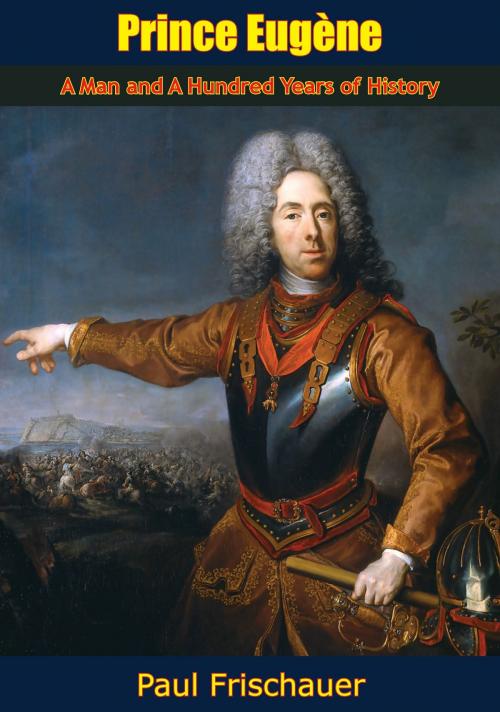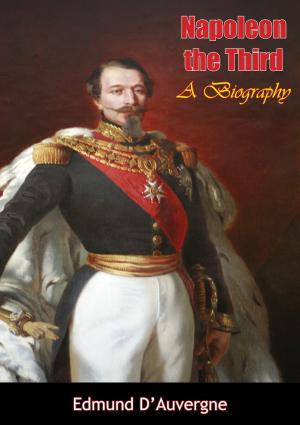Prince Eugène
A Man and A Hundred Years of History
Nonfiction, History, Military, Other, Germany, British| Author: | Paul Frischauer | ISBN: | 9781787208544 |
| Publisher: | Borodino Books | Publication: | January 12, 2017 |
| Imprint: | Borodino Books | Language: | English |
| Author: | Paul Frischauer |
| ISBN: | 9781787208544 |
| Publisher: | Borodino Books |
| Publication: | January 12, 2017 |
| Imprint: | Borodino Books |
| Language: | English |
First published in 1934, this is a biography of Prince Eugene of Savoy (18 October 1663 - 21 April 1736), one of the most successful military commanders in modern European history.
Born in Paris, he grew up around the French court of King Louis XIV. Initially prepared for a career in the church, by the age of 19 Eugene had determined on a military career; however, rejected by Louis XIV for service in the French army, he moved to Austria and transferred his loyalty to the Habsburg Monarchy.
Spanning six decades, he served three Holy Roman Emperors: Leopold I, Joseph I, and Charles VI. He first saw action against the Ottoman Turks at the Siege of Vienna in 1683 and the subsequent War of the Holy League, before serving in the Nine Years’ War, fighting alongside his cousin, the Duke of Savoy. The Prince’s fame was secured with his decisive victory against the Ottomans at the Battle of Zenta in 1697, earning him Europe-wide fame.
The Prince enhanced his standing during the War of the Spanish Succession, where his partnership with the Duke of Marlborough secured victories against the French on the fields of Blenheim (1704), Oudenarde (1708), and Malplaquet (1709). He gained further success in the war as Imperial commander in northern Italy, most notably at the Battle of Turin (1706). Renewed hostilities against the Ottomans in the Austro-Turkish War consolidated his reputation, with victories at the battles of Petrovaradin (1716), and the decisive encounter at Belgrade (1717).
Throughout the late 1720s, Eugene’s influence and skilful diplomacy managed to secure the Emperor powerful allies in his dynastic struggles with the Bourbon powers: he helped to save the Habsburg Empire from French conquest; he broke the westward thrust of the Ottomans, liberating central Europe after a century and a half of Turkish occupation; and he was one of the great patrons of the arts whose building legacy can still be seen in Vienna today.
First published in 1934, this is a biography of Prince Eugene of Savoy (18 October 1663 - 21 April 1736), one of the most successful military commanders in modern European history.
Born in Paris, he grew up around the French court of King Louis XIV. Initially prepared for a career in the church, by the age of 19 Eugene had determined on a military career; however, rejected by Louis XIV for service in the French army, he moved to Austria and transferred his loyalty to the Habsburg Monarchy.
Spanning six decades, he served three Holy Roman Emperors: Leopold I, Joseph I, and Charles VI. He first saw action against the Ottoman Turks at the Siege of Vienna in 1683 and the subsequent War of the Holy League, before serving in the Nine Years’ War, fighting alongside his cousin, the Duke of Savoy. The Prince’s fame was secured with his decisive victory against the Ottomans at the Battle of Zenta in 1697, earning him Europe-wide fame.
The Prince enhanced his standing during the War of the Spanish Succession, where his partnership with the Duke of Marlborough secured victories against the French on the fields of Blenheim (1704), Oudenarde (1708), and Malplaquet (1709). He gained further success in the war as Imperial commander in northern Italy, most notably at the Battle of Turin (1706). Renewed hostilities against the Ottomans in the Austro-Turkish War consolidated his reputation, with victories at the battles of Petrovaradin (1716), and the decisive encounter at Belgrade (1717).
Throughout the late 1720s, Eugene’s influence and skilful diplomacy managed to secure the Emperor powerful allies in his dynastic struggles with the Bourbon powers: he helped to save the Habsburg Empire from French conquest; he broke the westward thrust of the Ottomans, liberating central Europe after a century and a half of Turkish occupation; and he was one of the great patrons of the arts whose building legacy can still be seen in Vienna today.















